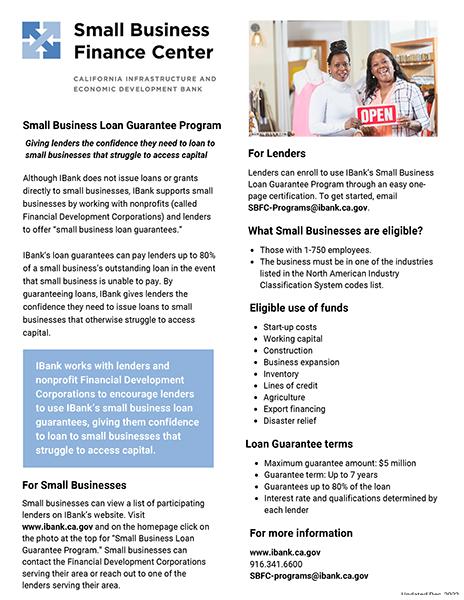The Small Business Administration (SBA) offers various loan programs to assist small businesses. Among them, the 7(a) and 504 loan programs are particularly popular for their flexibility and accessibility.
Navigating the landscape of small business financing can be daunting, yet it is crucial for entrepreneurs seeking to start or grow their companies. Understanding the available loan programs helps business owners make informed decisions that align with their financial needs and business goals.
These programs are tailored to support small businesses in different stages of growth, providing capital for a range of purposes including startup costs, expansion, and equipment purchasing. With favorable terms and lower interest rates, SBA loans are a valuable resource for small business owners looking to secure financing with manageable repayment conditions.
Introduction To Small Business Financing
Small business financing unlocks growth doors. It’s key for starting, running, and expanding. Today, we dive into the world of loans and funding options for small ventures.
The Importance Of Capital
To thrive, businesses need capital. It’s for inventory, staff, marketing, and more. Without funds, even great ideas stall. Capital is the fuel for small business success.
- Start-up costs: Funds cover initial expenses.
- Growth: Money helps businesses expand.
- Cash flow: Capital manages daily operations.
Challenges Faced By Small Businesses
Small businesses often struggle to get loans. Banks may see them as risky. Yet, these companies still need funds to compete and grow.
| Challenge | Impact |
|---|---|
| Strict lending criteria | Limits access to loans |
| High-interest rates | Increases repayment burden |
| Limited credit history | Reduces financing options |

Credit: selectfultoncounty.com
Types Of Loan Programs
Finding the right loan can help your business grow. Let’s explore different types of loan programs available for small businesses. Each one has its own benefits. Choose the best fit for your needs.
Traditional Bank Loans
Traditional bank loans are common for businesses. Banks offer these loans. They usually have lower interest rates. But, they require a good credit score. Getting approved might take time.
Sba Loans
The Small Business Administration (SBA) backs SBA loans. This makes it easier for small businesses to get loans. SBA loans have flexible terms and fair rates. They are great for businesses looking to grow.
Online Lenders
Online lenders offer quick and easy loans. Perfect for businesses needing money fast. They have higher interest rates than banks. But, they approve loans faster and require less paperwork.
| Loan Type | Pros | Cons |
|---|---|---|
| Traditional Bank Loans | Lower interest rates, stable | Requires good credit, slow approval |
| SBA Loans | Flexible, fair rates | Can be competitive |
| Online Lenders | Fast, easy | Higher interest rates |
- Think about your needs before choosing a loan.
- Compare different options to find the best one.
- Read the terms carefully before agreeing.
Understanding Sba Loan Programs
Small businesses are the backbone of the economy. They create jobs and foster innovation. Yet, securing funding remains a hurdle. Enter the Small Business Administration (SBA). The SBA offers loan programs tailored for small businesses. These programs make obtaining necessary funds easier. Let’s dive into some key SBA loan options available.
7(a) Loan Program
The 7(a) Loan Program is SBA’s primary offer. It’s versatile. Companies use it for various needs like expanding, operating, or purchasing assets.
- Loan Size: Up to $5 million.
- Use Cases: Capital, real estate, equipment.
- Terms: Favorable. Can extend up to 25 years.
504 Loan Program
The 504 Loan Program supports long-term investments. Think property and heavy machinery. It promotes growth and job creation.
| Benefits | Details |
|---|---|
| Low Interest Rates | Fixed, below-market rates. |
| Long-term Repayment | Up to 20 years for real estate. |
| Loan Amount | Maximum of $5.5 million. |
Microloan Program
The Microloan Program fills a niche. It’s perfect for small-scale needs. Startups and smaller entities benefit most.
- Max Amount: $50,000.
- Purpose: Working capital, inventory, supplies.
- Repayment Terms: Up to 6 years.

Credit: njbmagazine.com
Benefits Of Small Business Loans
Benefits of Small Business Loans offer lifelines to companies aiming for growth. They provide essential funds to cover various costs. This money helps businesses expand, innovate, and remain competitive.
Access To Capital
Access to capital stands as the primary advantage. Small business loans allow companies to invest in their future. They can buy new equipment, stock up on inventory, or hire more staff. This access is crucial for businesses to seize growth opportunities.
Flexible Payment Terms
Loan options often include flexible payment terms. This flexibility can match loan repayments with business cash flow. It can reduce financial pressure on small businesses. Short-term loans might suit seasonal businesses, while long-term loans may fit large investments.
Credit Building Opportunities
Credit building opportunities arise with every successful repayment. A strong credit history opens doors to larger loans and better rates. It also enhances business credibility. New businesses can especially benefit from this to establish a solid credit foundation.
Eligibility Criteria For Borrowers
Small businesses need funds to grow. Banks and lenders offer loans. But, not everyone gets a loan. You must meet some requirements. Let’s talk about these eligibility criteria for borrowers.
Credit Score Requirements
Your credit score is like a report card for your finances. It shows if you are good at paying back money. Lenders look at this score.
- 700+: Excellent – You can easily get loans.
- 620-699: Good – You might get loans but at higher interest.
- Below 620: Fair – Getting loans is tough.
Business Revenue And Profitability
Lenders want to know if your business makes money. They check your revenue and profit. More money means a better chance to get a loan.
They often look for:
- Steady income over the past two years.
- Growth in revenue and profit.
Collateral And Guarantees
Sometimes, you need to promise something valuable. This is called collateral. It could be equipment or property. If you can’t pay back, the lender can take this.
A personal guarantee may also be needed. This means if your business can’t pay, you will.
| Type | Examples |
|---|---|
| Collateral | Property, Equipment |
| Guarantees | Personal, Business |
Navigating The Application Process
Small businesses often need financial support to grow. Loan programs provide vital funds. The application process can seem tough. Guidance is key. Let’s navigate it together.
Preparing Your Loan Application
A strong application starts with preparation. Know your business inside out. Understand your financial health. Lenders look for organized applicants. Show them you mean business.
- Outline your business plan.
- Detail your growth strategy.
- Review your credit history.
Documents Needed
Gather your documents early. This step saves time. Keep them accurate and up-to-date. Essential documents include:
| Document Type | Description |
|---|---|
| Business Plan | A roadmap of your business goals. |
| Financial Statements | Shows your business health. |
| Tax Returns | Proves your business history. |
| Legal Documents | Includes licenses, registrations. |
Tips For A Successful Loan Interview
Your loan interview is crucial. Approach it with confidence. Practice your pitch. Be ready to answer questions. Dress professionally. Show respect to the lender. Here’s what to do:
- Practice your business pitch.
- Be clear on loan use.
- Show repayment plans.
- Ask questions.
- Follow up post-interview.
Strategies For Loan Repayment
Securing a loan is a major step for small businesses. But it’s the repayment that often poses a challenge. With the right strategies, managing loan repayment can become more manageable and less daunting. Let’s explore the tactics that can help you stay on top of your loan repayments without compromising the financial health of your business.
Planning Your Finances
Effective financial planning is key to successful loan repayment. Start by reviewing your business budget. Identify areas where you can cut costs. Allocate funds specifically for loan payments. Ensure you include these payments in your monthly financial planning. This helps prevent missed payments and keeps your credit score healthy.
- Set up automatic payments: Avoid late fees and missed deadlines.
- Monitor cash flow: Keep track of incoming and outgoing funds.
- Adjust your budget: Make changes to save more money for repayments.
Refinancing Options
Refinancing can offer relief if the current loan terms are not favorable. Explore refinancing options that offer lower interest rates or extended repayment terms. This can lead to lower monthly payments. Compare lenders and choose the one that suits your business needs.
- Research multiple lenders for better rates.
- Evaluate the long-term benefits of refinancing.
- Consult a financial advisor before making a decision.
Dealing With Financial Difficulties
Financial hurdles are common in business. It’s vital to address them proactively. Communicate with your lender if you foresee payment issues. Many lenders offer hardship programs or can negotiate payment terms. This can include payment deferrals or loan modifications. Be transparent and proactive to find a solution.
| Action | Benefit |
|---|---|
| Contact your lender | Discuss hardship options. |
| Review your budget | Find areas to redirect funds. |
| Seek advice | Get professional financial guidance. |

Credit: www.ibank.ca.gov
Alternative Financing Options
Small business owners often need funds to grow. Banks are not the only option. Let’s explore some alternative ways to find money.
Crowdfunding
Crowdfunding lets people invest small amounts into your business. Sites like Kickstarter and Indiegogo are popular platforms. You share your business idea online. People give money if they like it. This can be a great way to raise funds without taking on debt.
- Set a funding goal
- Offer rewards for backers
- Reach a wide audience quickly
Angel Investors And Venture Capital
Angel investors provide funds for a share in your company. They are often successful entrepreneurs themselves. Venture capitalists are similar but usually invest larger amounts. They also want a piece of your business. Both can offer valuable guidance and resources beyond just money.
| Type | Investment Size | Equity Required |
|---|---|---|
| Angel Investors | Smaller | Yes |
| Venture Capital | Larger | Yes |
Bootstrapping And Personal Savings
Using personal savings is called bootstrapping. It means starting small and reinvesting your profits. You control your business fully. You also take all the financial risk. This path requires careful budgeting and financial discipline. Success means not sharing profits or control with others.
- Start with what you have
- Reinvest earnings
- Grow at your own pace
Success Stories
Many small businesses have transformed their dreams into reality. The right loan program can spark such success. Here, we celebrate the triumphs of those who seized opportunity.
Case Studies Of Businesses That Thrived
Real-world examples inspire and instruct. We explore small businesses that scaled new heights through strategic financing.
- Bake My Day: A local bakery used a microloan to upgrade equipment. Sales soared.
- Green Thumb Gardens: A landscaping company secured an SBA loan. They expanded their services.
- TechSavvy Solutions: An IT startup utilized a business line of credit. They innovated faster.
Each story underscores the impact of timely financial support. These businesses now lead in their markets.
Lessons Learned From Their Experiences
Success teaches valuable lessons. Let’s distill wisdom from these thriving businesses.
- Research loan options thoroughly.
- Prepare a solid business plan.
- Understand repayment terms.
These lessons form a blueprint for success. Small businesses can learn and apply them. Growth can be a well-planned journey.
Future Of Small Business Financing
The Future of Small Business Financing looks bright. New trends and technology promise easier access to funds. This means more growth for small businesses.
Trends To Watch
- Alternative lending is on the rise. Banks are not the only option now.
- Crowdfunding becomes more popular. It’s a way to raise money from many people.
- Microloans help small businesses. They are easier to get than big loans.
The Role Of Technology
Technology changes how we get loans. It makes things faster and simpler. Here are two big changes:
- Online platforms connect lenders and borrowers. This saves time.
- AI and data analytics help lenders. They can make better decisions quickly.
Predictions For Small Business Growth
| Year | Growth Prediction |
|---|---|
| 2023 | Steady growth as technology improves |
| 2024 | Higher growth with more loan options |
| 2025 | Significant growth as small businesses flourish |
Frequently Asked Questions
What Are Top Loan Options For Small Businesses?
Small businesses have several loan options including SBA loans, business lines of credit, term loans, equipment financing, and merchant cash advances. Each has different terms and qualifications to meet diverse business needs.
How Do Sba Loan Programs Benefit Small Businesses?
SBA loan programs offer lower down payments, flexible overhead requirements, and no collateral needed for some loans. They’re designed to support small businesses’ growth and stability with government backing, reducing lender risk.
Can Startups Qualify For Small Business Loans?
Startups can qualify for small business loans, particularly with programs designed for new ventures. Lenders may require a solid business plan, credit history, or potential for success. Some loans are specifically tailored for startups.
What’s Required To Apply For A Small Business Loan?
Applying for a small business loan typically requires a business plan, financial statements, credit score, and proof of collateral. Lenders may also ask for your industry experience and legal business documentation.
Conclusion
Exploring the right loan program can propel your small business to new heights. With various options available, it’s essential to find one that aligns with your needs. Remember, informed decisions pave the way for financial stability and growth. So, take the step towards securing your business’s future today.
Success is just a loan away.
